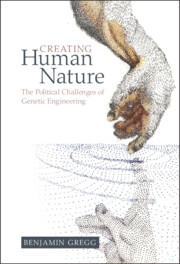Book contents
- Creating Human Nature
- Creating Human Nature
- Copyright page
- Dedication
- Contents
- Acknowledgments
- Introduction
- Part I The Political Bioethics of Regulating Genetic Engineering
- Part II The Political Dimensions of Engineering Intelligence
- Part III Inequality as an Unintended Consequence Locally and as a Planetary Phenomenon
- References
- Index
Introduction
Published online by Cambridge University Press: 13 October 2022
- Creating Human Nature
- Creating Human Nature
- Copyright page
- Dedication
- Contents
- Acknowledgments
- Introduction
- Part I The Political Bioethics of Regulating Genetic Engineering
- Part II The Political Dimensions of Engineering Intelligence
- Part III Inequality as an Unintended Consequence Locally and as a Planetary Phenomenon
- References
- Index
Summary
Human genetic engineering is one way in which humans can relate to nature. Nature includes the natural environments in which our species lives. It includes our species as it has evolved through natural selection. Our is a species with a capacity for creating artifacts, culture, and understandings of ourselves as moral beings. The borders between our genes and their environments are porous with our cultures. These borders are so porous that the distinction between nature and culture often collapses. For the position I develop in this book, namely bioethics as political theory, or political bioethics, they are profoundly intertwined. They are intertwined as genetic science and biotechnology, both cutting-edge expressions of the seventeenth- and eighteenth-century discourse of the European Enlightenment. Already in those centuries, two understandings of the term nature emerge that continue to define core aspects of possible human genetic engineering in the twenty-first century: nature as the basis for social equality among persons, and nature as the basis of human identity. In the unfinished project of modernity, prospects for engineering in a just society must improve upon the Enlightenment legacy of contemporary genetic science and biotechnology by reconceptualizing nature and its relationship to culture, above all with respect to equality and inequality among persons. This book gives itself that task.
- Type
- Chapter
- Information
- Creating Human NatureThe Political Challenges of Genetic Engineering, pp. 1 - 18Publisher: Cambridge University PressPrint publication year: 2022



